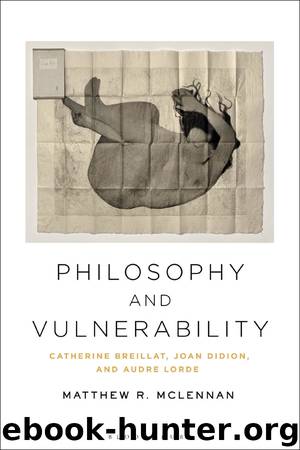Philosophy and Vulnerability by Matthew R. McLennan;

Author:Matthew R. McLennan;
Language: eng
Format: epub
Publisher: Bloomsbury UK
Audre Lorde enters the discussion at this point as an invaluable guide. It is important, first of all, to situate her with respect to intersectionality. The latter is, roughly,6 the theory and analytical tool according to which different oppressions organized along lines such as gender, race, class and disability intersect to create unique realities, challenges and injustices for persons belonging to socially marginalized groups. ‘Stock stories’ in the academic idiom claim that intersectionality was ‘coined’ by Kimberlé Crenshaw in 1991 (Crenshaw 1991; Collins and Bilge 2016: 80–4). But as Collins and Bilge relate above, it is above all the result of many African American and other racialized women’s thoughtful collaborations in response to certain practical frustrations in social justice organizing.7
Among these women was Lorde, who was already sketching intersectionality as a theory8 and incorporating it into her life as praxis long before what she was doing had a name (Collins 2009: 21; Collins and Bilge 2016: 80, 168–9). At a colloquium in 1980, for example, she related to the crowd that ‘[a]s a 49-year-old Black lesbian feminist socialist mother of two, including one boy, and a member of an interracial couple, I usually find myself a part of some group defined as other, deviant, inferior, or just plain wrong’ (Lorde 2017b: 94). On account of the complex social positioning of her identity according to intersecting vectors of oppression,9 virtually any social group or class to which Lorde belonged as a ‘sister’ could potentially also shun her as an ‘outsider’ (Lorde 1984). Thus, her social standing – or in my terms, her access to the mediating conditions of her innate vulnerability – was exceptionally precarious both in theory and in practice, as her autobiography or ‘biomythography’ Zami and other writings often attest (Lorde 1982). Her insider/outsider status makes Lorde an exceptionally well-placed witness regarding not only the social factors which tend to exacerbate human vulnerability, but also some of the resources and tactics at people’s disposal in the effort to overcome them.
Significantly, though she couples privilege with injustice throughout her writings, Lorde does not hold to a purely negative or critical understanding of it. As she put it,
To acknowledge privilege is the first step in making it available for wider use. Each of us is blessed in some particular way, whether we recognize our blessings or not. And each one of us, somewhere in our lives, must clear a space within that blessing where she can call upon whatever resources are available to her in the name of something that must be done. (Lorde 2017a: 129)
Download
This site does not store any files on its server. We only index and link to content provided by other sites. Please contact the content providers to delete copyright contents if any and email us, we'll remove relevant links or contents immediately.
Aircraft Design of WWII: A Sketchbook by Lockheed Aircraft Corporation(32189)
The Great Music City by Andrea Baker(31249)
Call Me by Your Name by André Aciman(20349)
The Secret History by Donna Tartt(18805)
The Art of Boudoir Photography: How to Create Stunning Photographs of Women by Christa Meola(18504)
Shoot Sexy by Ryan Armbrust(17637)
Plagued by Fire by Paul Hendrickson(17314)
Portrait Mastery in Black & White: Learn the Signature Style of a Legendary Photographer by Tim Kelly(16933)
Adobe Camera Raw For Digital Photographers Only by Rob Sheppard(16881)
Photographically Speaking: A Deeper Look at Creating Stronger Images (Eva Spring's Library) by David duChemin(16599)
Ready Player One by Cline Ernest(14493)
Pimp by Iceberg Slim(14319)
Bombshells: Glamour Girls of a Lifetime by Sullivan Steve(13952)
The Goal (Off-Campus #4) by Elle Kennedy(13468)
Art Nude Photography Explained: How to Photograph and Understand Great Art Nude Images by Simon Walden(12954)
Kathy Andrews Collection by Kathy Andrews(11708)
The Priory of the Orange Tree by Samantha Shannon(8855)
The remains of the day by Kazuo Ishiguro(8788)
Thirteen Reasons Why by Jay Asher(8767)
